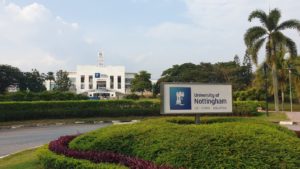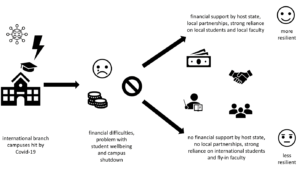The Covid-19 pandemic has severely impacted our daily lives and lead to the disruption of global value chains and cross-border mobility. International higher education has also been profoundly affected by these shifts, as international students have been unable to travel to their overseas campus locations and university campuses in many countries have shifted to online teaching. How are international branch campuses affected by the pandemic? Often these rely on substantial cross-border mobilities of students and staff for their operations and are deeply tied into translocal linkages with their home institutions. Will these investments into non-core activities of the university likely fall victim to the pandemic and simply close or will they assume new roles and are able to adapt their strategies?
Our research project, funded by the RSA Small Grant on Pandemics, Cities, Regions & Industry, ran an online-survey of international campus managers worldwide to understand the impact of the Covid-19 pandemic on international branch campuses and to analyse their future outlook. International branch campuses are a heterogeneous category, which escape easy definition. We define international branch campuses as physical presences of higher education institutions, which offer international degrees in a different country than their country of origin.

International Branch Campus of the University of Nottingham Malaysia – Photo Jana Kleibert
Study Findings
A key finding of our online survey among 29 international branch campuses managers world-wide is that international branch campuses that are more deeply embedded within their host country environments report to have been less severely impacted by the pandemic. Local embeddedness and the various linkages this includes, rather than home or host country contexts, seem to matter for how well international branch campuses have been able to cope with the effects of the pandemic.
Our survey findings reveal that rather than the general home or host institutional context, it is the existence of partnerships with actors in the region that ameliorates the effects of the pandemic.
Moreover, the less international branch campuses relied on international students and on international or fly-in faculty (who teach only short-term courses at the international branch campus), the more resilient they appear to be in the face of the Covid-19 pandemic.

Covid-19 Impacts and Resilience of International Branch Campuses
Figure design: Anne-Sophie Kagel, IRS
These findings suggest that what is relevant for higher education institutions in general, their deep regional embeddedness, the fostering of meaningful linkages with local actors, is also relevant for international branch campuses – which often tend to be smaller, newer, and less well embedded within their immediate surroundings. Regional policy makers and decision-makers at international branch campuses alike can aim to facilitate the embeddedness of international branch campuses within their host regions to achieve mutually beneficial outcomes.
The shift towards closer links with the host region may spur further opportunities for regional economic development, as collaboration with public and private actors increases the likelihood for human capital absorption and the regional spill-over of knowledge and innovation.

Jana Kleibert leads the Junior Research Group TRANSEDU (with Alice Bobée, Tim Rottleb and Marc Schulze as PhD Candidates) at the Leibniz Institute for Research on Society and Space, which analyses the construction of international branch campuses from an economic and urban geographic perspective. She received an RSA Small Grant on Pandemics, Cities, Regions & Industry to assess the effects and changing strategies of the Covid-19 pandemic.
Are you currently involved with regional research, policy, and development? The Regional Studies Association is accepting articles for their online blog. For more information, contact the Blog Editor at rsablog@regionalstudies.org.